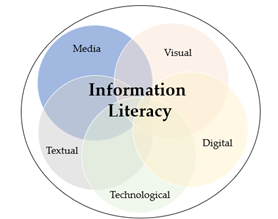Information Literacy: A Starting Point for School Communities
Information literacy is a set of skills that enables an individual to recognize when information is needed and to locate, evaluate and effectively use the needed information.
An information literate individual can…
| Determine What Information Is Needed | Identify and Evaluate Information | Use Information Effectively | Determine How to Create and Distribute Information |
|---|---|---|---|
|
|
|
|
Making Information Literacy Visible
- Invite curiosity! Foster an environment of inquiry.
- Think aloud! Model information literacy skills in all contexts and settings.

- Speak with accountability! Use accountable talk strategies to ensure every statement is supported by evidence.
- Don’t tell them; show them! Evaluate sources consistently and systematically with students as part of daily instruction.
- Rediscover the library! Reintroduce the library as the first stop for assistance with research and resources.
- Investigate! Encourage students to look past the first search “hits” and explore a variety of sources in libraries, databases, and search tools in their quests for information.
- Build your understanding! Construct knowledge with students through the evaluation and synthesis of sources to determine meaning and context.
- Cite your sources! Credit the sources of your information when you are speaking or writing.
- Reflect! Challenge community members to question their own research practices to build information literacy strength and stamina.
- It’s okay to not know! Show students that information grows and changes; educators continue to engage in the research process.
- Know your power! Recognize the weight of your words and distribute information responsibly.
The resources provided on this webpage are for informational purposes only. All resources must meet the New Jersey Department of Education’s (NJDOE) accessibility guidelines. Currently, the NJDOE aims to conform to Level AA of the Web Content Accessibility Guidelines (WCAG 2.1). However, the NJDOE does not guarantee that linked external sites conform to Level AA of the WCAG 2.1. Neither the NJDOE nor its officers, employees or agents specifically endorse, recommend or favor these resources or the organizations that created them. Please note that the NJDOE has not reviewed or approved the materials related to the programs.
 Official Site of The State of New Jersey
Official Site of The State of New Jersey